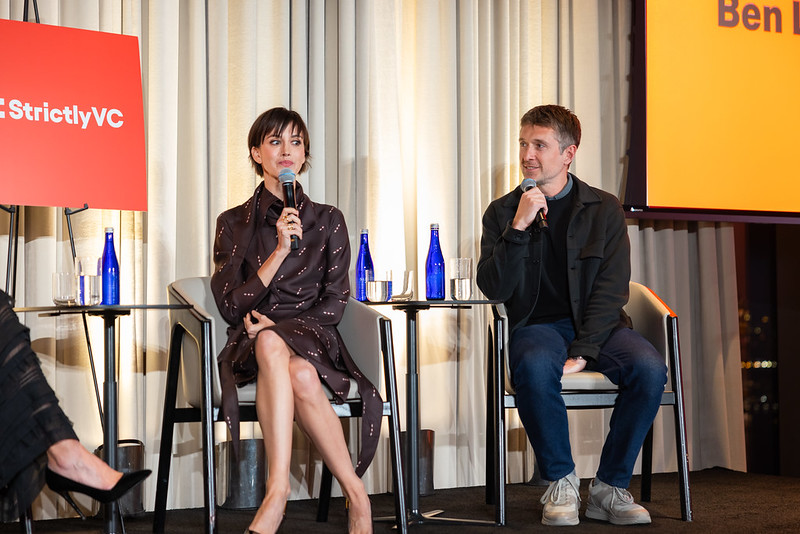[ad_1]
When Brynn Putnam sold her last company, Mirror, to Lululemon for $500 million at the start of the pandemic, it looked to this editor like she’d sold the smart fitness company too soon.
Instead, the timing proved brilliant. The home fitness craze crashed nearly as abruptly as it peaked during that first year of lockdowns. Meanwhile, after a year as a general manager at Lululemon, Putnam had new operating insights, a big win under her belt, and a fresh idea that she has since turned into a new company that will launch publicly in 2025.
The venture firm Lerer Hippeau has already participated in a highly competitive round for that stealthy startup – the firm led Mirror’s $3 million seed round years ago, too – and on Wednesday night in New York, I sat down with both Lerer Hippeau managing partner Ben Lerer and Putnam to talk about what she is building. We also talked about a broader rebound that’s happening at long last for consumer tech – some of it being led by founders who led the last wave of successful consumer startups.
Following are excerpts from that chat, edited lightly for length. You can also watch the full interview below.
Ben Lerer on writing that first check:
When we invested [in Mirror], Brynn had a very convincing but totally janky demo, which was basically a sort of like a two-way mirror with a computer screen behind it to show you what a mirror would look like if she was able to raise tens of millions of dollars to actually produce such a thing. Really interestingly, she had designed a contraption that was proprietary to her [own line of boutique gyms at the time] . . . and when we saw it, it was just clear that Brynn was not just a clever business builder who had built a good gym brand for herself but was also an inventor. Brynn won us over very, very quickly, and maybe we looked crazy for a few years, but eventually less so.
Brynn Putnam on selling Mirror just four years after founding it:
We weren’t for sale. We weren’t looking for an acquirer. We had just really launched. But we had a longtime partnership with Lululemon. I had worked with them at my gyms for about a decade, and we had been spending a lot of time with them, making content and doing interesting events with them, and it just felt like the right fit for us to be able to really take Mirror into homes across the world with speed and certainty. We really just felt like it was this opportunity we couldn’t pass on.
As for whether Lerer weighed in with advice on that sale, he said:
I did have an opinion on it. Look, venture is a funny business because of the power law and the idea that you’re supposed to take these moonshots and you’re going to have a bunch of losses but your big wins are going to change the whole world. I believe in the power law, but I also think sometimes venture loses sight of just really basic, good, sound business decision-making. And there are some general truths in business, like: sell when others are greedy, and buy when others are scared. You don’t always have to continue to go back to the casino again and again and again. In this case, when Brynn came and said, ‘Hey, I got this offer, I’m really thinking about taking it,’ I said, ‘Yeah, you should do this for you; this is amazing for us. And if you’re getting pushback from other folks [like later-stage investors with a different cost basis], I’m happy to try to be helpful, but you’re frankly much more forceful and powerful than I am and you’ll take care of this.’ For a year or two after, I think Brynn probably got some people who second-guessed it, and now I think people see the arc of the entire category and realize it was just a totally brilliant move.
Putnam on working afterward as an exec at Lululemon, which later threw in the towel on Mirror:
An investor who I admire . . .told me at the time that I should be gracious and learn, that throughout the life of your company, you’re selling your company. You’re selling it in small pieces, or you’re selling it in bigger pieces, but you’re always selling your company. And the best thing you can do once you have made the decision to sell, is to really learn as much as you can from this business that you’ve chosen to sell to and try to tackle something with purpose in this new role. And that is what I did. And I learned an incredible amount in the year that I was there, and it was incredibly interesting. But I think ultimately, when you go from being a founder and CEO to effectively the general manager of a division, it’s a very large change, and for some people, it’s a fit. And for me, it just was not. I’m really a builder.
Putnam on what led her to develop her new startup:
When I left Lululemon, I was really just at a different stage of my life. I went from being pregnant to then having two children, and really, I just took stock of what was important to me at that point. Mirror was very much about me. It was my reflection, my performance, it was about making your own self better. At that next phase, my life was really just much more about my family and my friends and my relationships and those things that I was finding important. I was really struggling to find quality time with my loved ones the way that I had growing up — you know, we would sit around the table and have a meal, play a board game, look each other in the face. For my kids who have grown up glued to iPads or smartphones, the experience of quality time was more challenging.
So I really started to think about, how could I take what I learned at Mirror and apply those lessons to the category of play? How could I use tech to build better social relationships and connections? And that’s what I’m working on now. It’s a new consumer hardware company, but in the gaming space rather than fitness, really geared towards how we spend time together face to face, where technology is not the experience but really an enabler to building better relationships.
Asked if her new product is for children (or if it fits in one’s pocket, or one wears it on their face), Putnam answered:
It’s for everyone. It’s for friends and families spending time together. It’s not a kids’ company, although we do hope you’ll participate with your kids. It’s not an education company, although we do hope that people find it interesting and strategic and creative, but it’s really about using tech to connect people to each other. (Here Lerer declared he was sworn to secrecy by Putnam.)
Putnam on the confluence of AI and hardware and software that seems very much top of mind for founders and investors suddenly:
I think we’re about to enter a golden age of hardware. All the VCs here are going to be so excited to invest in hardware founders soon, hopefully [because a] few things are happening. The iPhone came out 17 years ago, and we haven’t really had a mainstream consumer hardware success story since Oculus. I think there’s an opportunity on the market for something new. A lot of the core components of these technologies are becoming a lot more mature and therefore affordable, so being able to build, in our case, display technologies, is possible in a way now that it wasn’t 10 years ago. And then obviously AI is opening the door for how we interact with our devices. So naturally, there will be new devices on the market. We’re betting on this idea of not another personal computer but rather a new shared device in the home, which is what we did with Mirror and what we’re doing again here. This idea that there will be a piece of tech that helps bring your house and family together is where we think the future is headed.
On not focusing too much on the technical specifications of hardware but focusing more on the overall experience being created, Putnam said:
I learned recently about Nintendo’s design philosophy. They have this concept that they use ‘withered’ technology with lateral thinking. So the idea is using mature, affordable, more readily available technologies but creating a really interesting experience around them, and that is what we did with Mirror. It was rather commodity hardware. It wasn’t frontier tech. And [that’s] what we’re doing again now.
On bringing family and friends together as an investing theme (here, this editor brought up the new startup of Bonobos co-founder Andy Dunn, Pie, which focuses on bringing people together offline), Lerer said:
I’m an investor [in Pie]! Look, I have young kids and I have the same challenges that all my friends have and everyone has: we’re all hopelessly addicted to these devices, and at a high level, we’re interested in alternatives to that addiction and new formats of entertainment or opportunities to get people off of screens or out in the world. We very recently did a [related] deal that’s not yet announced in an application layer AI company in the travel space that I’m really excited about. And we just announced a deal this past week in another application layer company in the aftermarket automotive space, which is actually the biggest hobbyist area by spend in the U.S. Finding ways to tap into people’s passions is always a good bet in the consumer space.
On the feeling that ‘consumer’ as a category is swinging back – including thanks to a new $500 million fund announced this past week by the well-known consumer-focused firm Forerunner Ventures, Lerer said:
As a fund, we’re founder first, but we’re also New York first, and [with] the first [founder] generations of New York in the early 2010s, there was a lot of consumer, a lot of media, a lot of direct to consumer commerce. And there were a few trends that really drove that. You had the rise of the iPhone and the App Store. You had social media exploding and the arbitrage ad ecosystem opportunity to go and grab customers faster than ever. Maybe the rise of Shopify as well created a great time to go build consumer businesses with a wide open imagination.
Over the last four, five, six years, there’s been very little in terms of big tech changes that inspire people to do anything that doesn’t feel incremental. And I do think that AI is that catalyst right now. We’re seeing a very high quality group of founders saying, ‘Now’s the time to get back in the pool.’ There are things that are possible today that weren’t possible six months ago or a year ago, and the slope is steep right now in terms of using your imagination. So I’m more excited about consumer than I’ve been in a long time, which is really exciting for me because that’s my passion. I built a consumer business. I love investing in consumer founders, and it’s been pretty crappy the last few years, quite frankly.
[ad_2]


